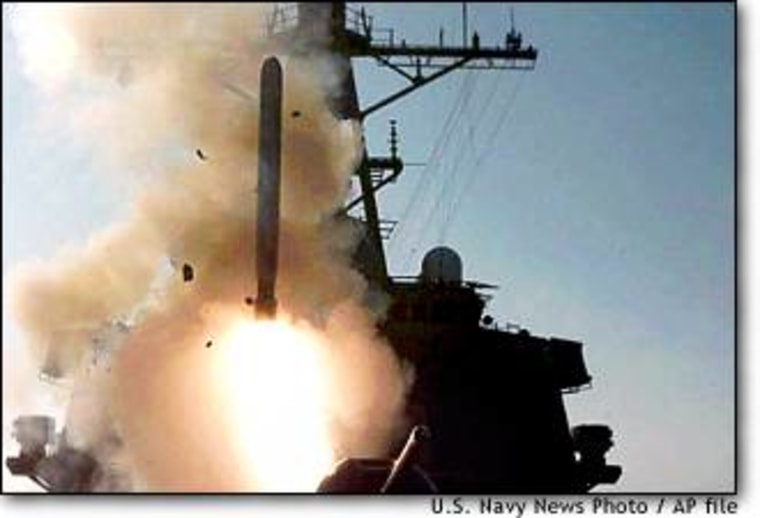With the United States edging closer to a possible conflict with Iraq and the U.S. defense budget expected to rise sharply in coming years, shares of U.S. defense companies should be rallying, but instead they are under fire.
Shares of big-name defense companies like Northrop Grumman moved steadily higher in the months following the Sept. 11 attacks. The sector was perceived as an area promising steady, predictable growth. Greater attention on homeland security, military action in Afghanistan and the potential for a war with Iraq all looked likely to push the sector ever higher.
The sector hit a peak for 2002 in June, but has since tumbled. Northrop Grumman, for example, is now down about 30 percent from its June 2002 level. And two key defense sector indices — the Amex Defense Index and the Philadelphia Defense Index — are off 6.5 percent and 7.6 percent, respectively, since the start of 2003. At the same time the Standard & Poor’s 500-stock index, a broad stock market measure, is down 2.1 percent for the year.
Another weight for the defense areas has been a generally lackluster fourth-quarter earnings season.
On Friday, Raytheon, which is the subject of an informal investigation by the Securities and Exchange Commission, and Lockheed Martin reported losses for the quarter ended Dec. 31, mostly due to special charges. And on Wednesday, shares of General Dynamics slumped after the weapons maker said its earnings fell 36 percent from the same period one year ago, mainly because of trouble in its Gulfstream business-aircraft division.
But despite the lackluster earnings news, analysts say the sector’s growth prospects remain promising.
According to Peter Arment, an aerospace analyst at JSA Research, an independent research firm covering the aerospace and defense industries, most of the recent softness in defense stocks can be attributed to sector rotation seen in the market since the beginning of the year. “Institutions have been taking profits from their defense holdings and moving them into the beaten-down technology and telecom sectors in the belief that the defense sector’s rally is over,” Arment said.
Arment disagrees with this judgment, saying the sector’s sell-off has simply brought valuations down to more attractive levels. He expects the sector to see double-digit earnings growth over the next several years. “With an expected increase in defense spending in the next few years, I think we’ll see higher performances and higher valuations,” he said.
Defense spending expected to rise
Defense stocks tend to follow the fortunes of the nation’s defense budget, which is expected to rise 13 percent in 2003 from 2002 levels, said Arment, noting that the impact on stock prices won’t be seen for a year or so. “Defense spending is estimated to go up by 4 percent in 2004,” he added. “That’s down from the year before, but we expect to see a lot of supplemental contracts, and that could push the rate of investment up to 8 percent.”
Last October, President George W Bush signed into law the $355.1 billion military spending bill, the biggest increase in military spending in two decades.
Contrary to conventional wisdom, a war with Iraq won’t necessarily help the performance of defense stocks in the short-run, analysts say.
In 1991, at the time of the Gulf War, investors sold stocks before the war began and bought them just as hostilities started, making a profit, as defense stocks began their long rise after events in the Gulf region became violent. However, the notion that the sector may follow a similar path if there is a second Gulf War is misleading, according to a report by James McIlree, an analyst at C.E. Unterberg, Towbin.
“The difference now vs. the first Gulf war is that the group’s valuation is not significantly lower than the rest of the market’s,” McIlree wrote in the report. “This parity, we believe, will make it difficult for the group overall to post gains similar to those after the first Gulf War should there be another war (and we think there will).”
Still, McIlree expects 2003 to be a good year for the defense group, given the projections for military spending, which should “compare favorably” with the overall economy, which is likely to see more modest growth given the weak capital expenditure environment, he said. Near the end of 2003, investors will need to be concerned with how that comparison could change, he added.
“The overall economy likely will be better in 2004 than 2003, and given the budget intentions for fiscal 2004, defense spending is unlikely to match the 13 percent increase this year,” McIlree wrote.
In the long run, however, Arment is even more bullish. He thinks the strong growth in the industry can be sustained over the next two to three years.
“Defense stocks performed well before the first Gulf War because there was a lot of investment in defense in the ’80s. But there was less investment in the ’90s, so the nation’s weapons systems have aged dramatically. So upgrading those systems will mean big business for the next couple of years,” Arment said.
To position oneself for the likely benefits, Arment recommends large-cap stocks like Northrop Grumman, Lockheed Martin and Alliant Techsystems, a mid-cap maker of military ammunition missile components that this week reported strong quarterly earnings. He also recommends small-cap issues like EDO and DRS Technologies.
Stocks to avoid include Anteon International and Veridian, providers of information-technology defense services, he said. Both companies went public in 2002, and their stock prices have held up well in comparison to the rest of the defense sector, said Arment.
“They have been dubbed homeland-security plays, but I think their valuations may have gotten ahead of themselves,” Arment noted. “We might see pull-backs.”
